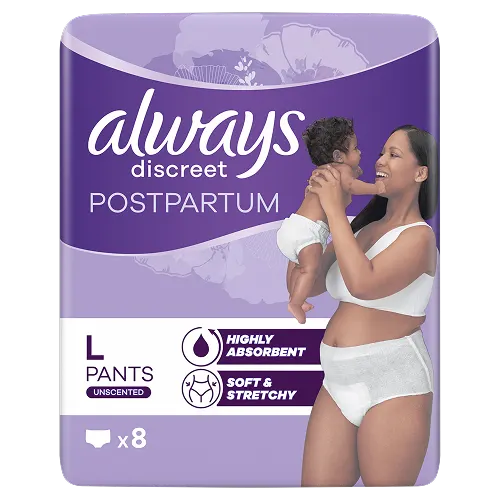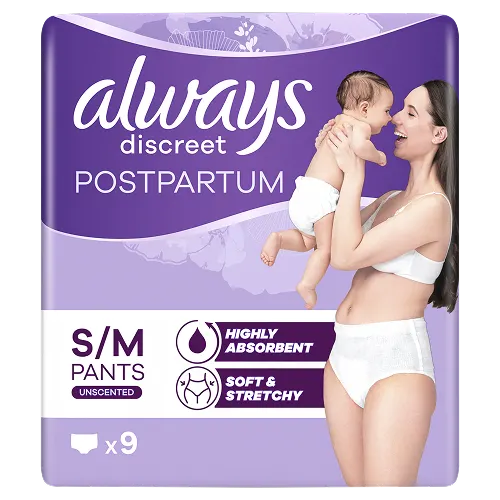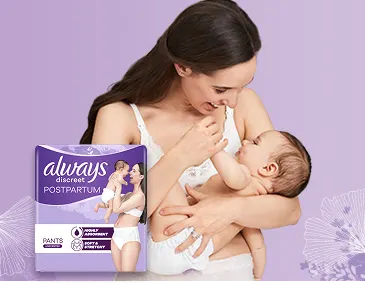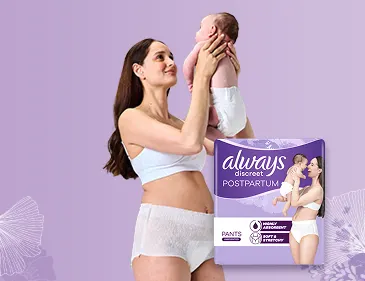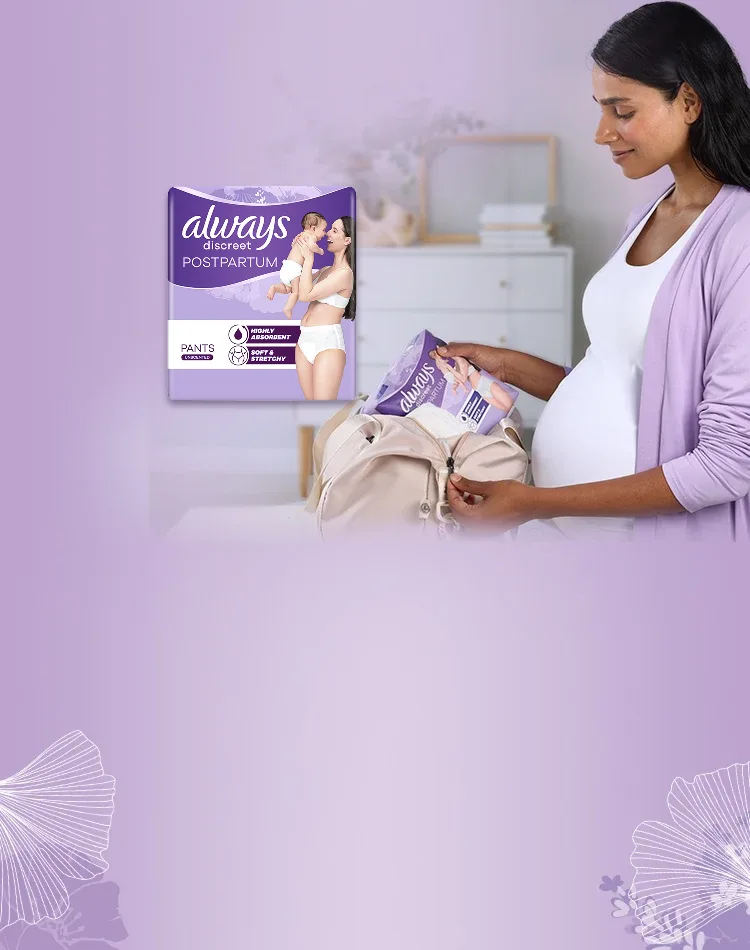
Every expectant mother, at some point, starts wondering what she should pack for childbirth. Packing a hospital bag for labour can be a challenge, so it’s worth preparing well in advance. Other moms are happy to share their experiences, but the best solution is a detailed hospital bag check list to help avoid unnecessary stress. It’s also a good idea to check the recommendations of your chosen hospital, as each facility may have its own requirements for what’s needed in the delivery room. What do you need in your hospital bag for labour? Here are some hints to those questions.
Table of content:
When and how to pack your hospital bag for childbirth?
Packing a hospital bag for labour is an essential part of preparing to welcome your baby into the world. It’s best to do this well in advance to avoid stress in the final days before delivery. What to pack in your hospital bag for labour? It’s best to divide your hospital bag into three sections:
- Essentials for before labour (e.g., documents, medical test results, toiletries)
- Items for the delivery room;
- Supplies for a multi-day hospital stay for both mom and baby
Choosing the right bag also matters—a medium-sized rolling suitcase or a comfortable travel bag works best. To stay organised, use transparent pouches or organisers and label them accordingly. To help you stay prepared, download and print out our hospital bag checklists here.
Well-planned packing for both mom and baby will prevent last-minute searching for essentials in crucial moments. There’s no need to overpack—your loved ones can always bring any missing items if necessary.
Check out: Pregnancy, Incontinence, and New Mums.
Maternity hospital bag
A well-prepared newborn hospital bag ensures mom’s comfort and helps parents stay calm during their first moments together. The hospital bag essentials for mom should include documents, comfortable clothing, hygiene products, and accessories to facilitate labour and hospital stay.
Hospital bag checklist for labour
- Loose labour gown – preferably breathable and one you can dispose of later;
- Warm socks – it’s common for women feel cold in their feet during contractions;
- Slippers and shower flip-flops – preferably non-slip;
- Lip balm – deep breathing and effort can cause dry lips;
- Still water in small bottles with a spout – easy to drink even while lying down;
- Small snacks – bananas, chocolate, fruit purees, nuts;
- Thermal water spray or a damp sponge – to refresh the face;
- Hair tie or headband – to keep hair out of the way during labour;
- Massage oil – can help with muscle relaxation;
- Hot water bottle or ice pack – to relieve pain.
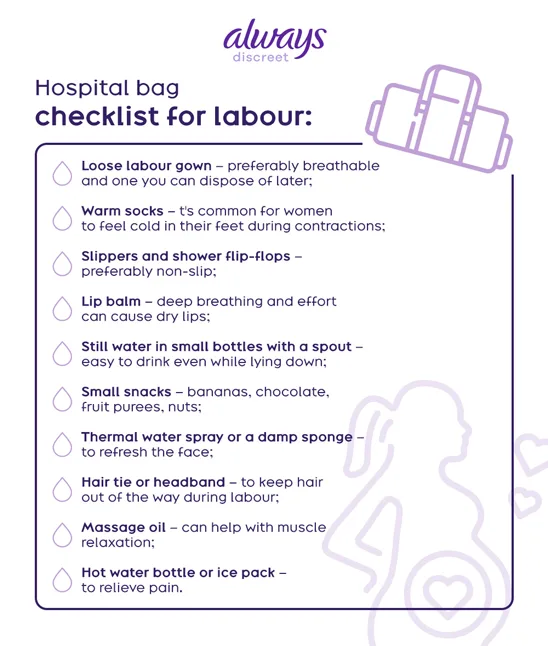
Hospital bag essentials (after childbirth)
After childbirth, the body undergoes many changes, so it’s good to have comfortable clothing and hygiene products on hand:
- 2–3 nursing nightgowns – preferably with front buttons for easy access;
- Bathrobe – light and breathable, ideal for walking around the ward;
- Postpartum pants (2–3 packs) disposable, supporting the abdomen, and highly absorbent, necessary during the postpartum period;
- Nursing bras (2 pcs.) – preferably without underwires, soft and stretchy;
- Breast pads – essential when milk production starts;
- Towels (2 pcs.) – One for the body, another for intimate hygiene;
- Wet wipes and tissues – useful in any situation;
- Toilet paper – soft, as the skin can be very sensitive after childbirth.
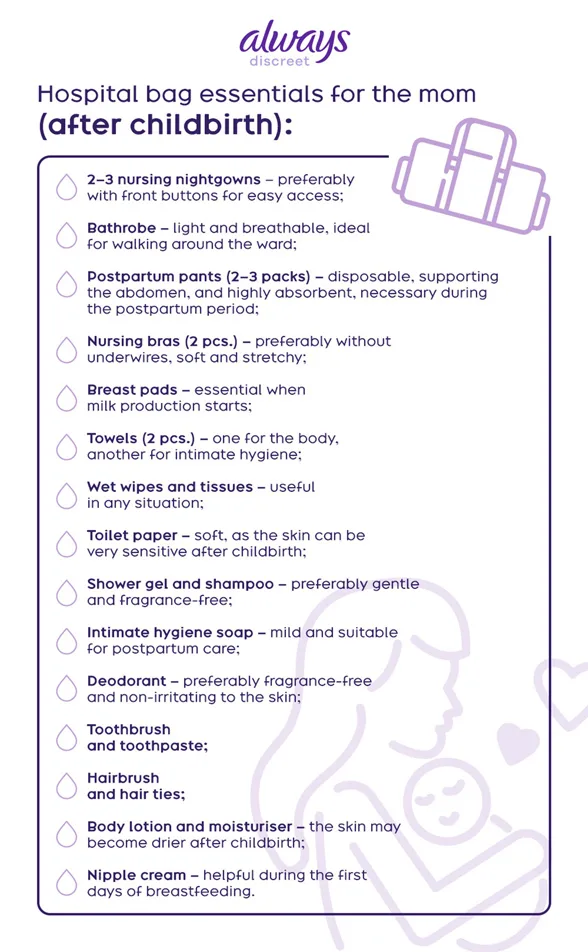
During your hospital stay, basic personal care is important, so it’s a good idea to pack the following items in your hospital bag for labour:
- Shower gel and shampoo – preferably gentle and fragrance-free;
- Intimate hygiene soap – mild and suitable for postpartum care;
- Deodorant – preferably fragrance-free and non-irritating to the skin;
- Toothbrush and toothpaste;
- Hairbrush and hair ties;
- Body lotion and moisturiser – the skin may become drier after childbirth;
- Nipple cream – helpful during the first days of breastfeeding.
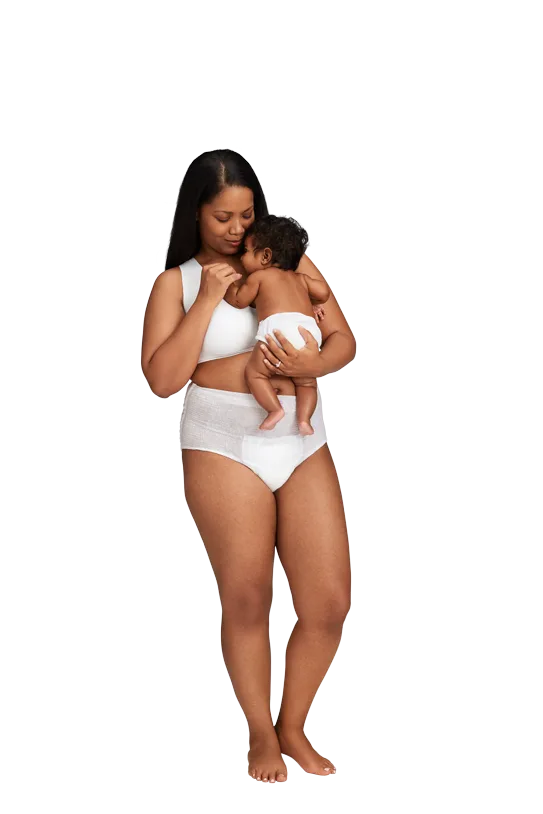
See also: How to choose the postpartum underwear?
Newborn hospital bag checklist - what to pack?
It’s good to start packing your newborn hospital bag with clothing essentials, such as: 3–4 sleepsuits; 3–4 bodysuits; 2–3 light jackets or cardigans; 2 hats; socks and scratch mittens; a warmer jacket or winter overall for going home in colder weather. Diapering Essentials:
- Newborn disposable diapers;
- Cotton muslin cloths;
- Baby wipes;
- Changing pads;
- Diaper rash cream.
Baby care products should include a gentle baby wash, baby oil, saline solution, sterile gauze pads, soft baby hairbrush. Baby comfort items such as a warm blanket, a swaddle or baby wrap.
Hospital bag checklist: important documents
When admitted to the hospital, you’ll need to present essential documents and recent test results. It’s a good idea to prepare these in advance and keep them easily accessible. Key documents:
- ID – required for hospital admission formalities;
- Pregnancy record book – includes the full history of your pregnancy, test results, and health information about both mother and baby;
- Birth plan – if you have one, bring it along to communicate your preferences to the medical staff.
Recommended test results to bring:
- Blood type and Rh antibody screen – especially important if you’re Rh-negative;
- Recent blood test results – to help assess your current health;
- GBS test (Group B Streptococcus) – typically done after the 35th week of pregnancy;
- Infectious disease tests: HIV, VDRL (syphilis), HCV, HBsAg (Hepatitis B);
- Toxoplasmosis IgG/IgM – especially if the first-trimester result was negative;
- Pregnancy ultrasounds – the most recent scan and any previous imaging if available.
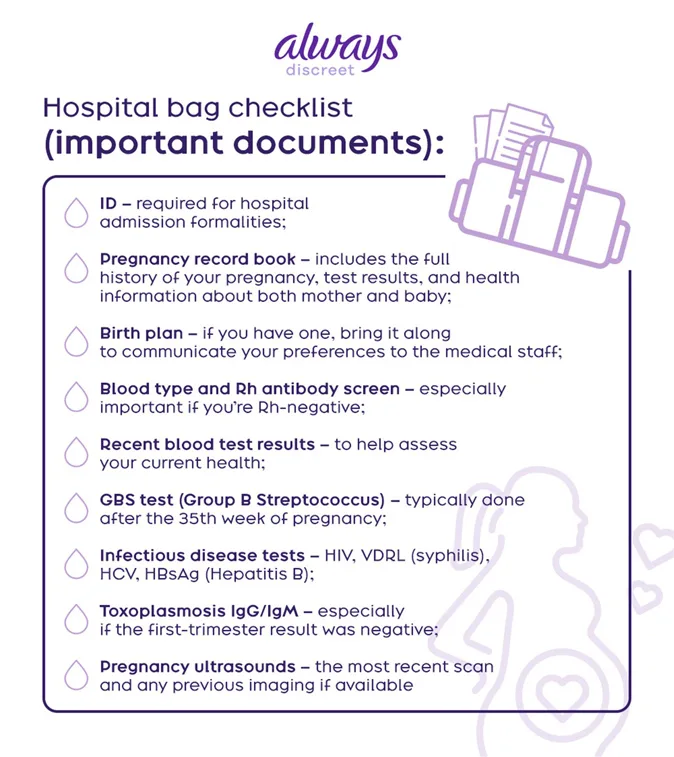
Hospital bag for labour: what not to pack
While the hospital bag checklist is extensive, it also helps you avoid packing unnecessary items that will only take up space. What you don’t need in your maternity hospital bag: Breast pump – hospitals usually provide equipment if needed; Baby nail scissors or files – newborn nails are very soft, and trimming usually happens at home; Teats and formula feeding bottles – if supplementation is needed, nurses will provide special syringes or disposable teats; Toys and rattles – unnecessary for a newborn in the first days of life; Car seat and going-home outfit – it’s better to have a family member bring these on discharge day. A properly packed hospital bag will make your hospital stay more comfortable and stress-free.
Check Always Discreet Postpartum Pants size S/M and Always Discreet Postpartum Pants size L.

